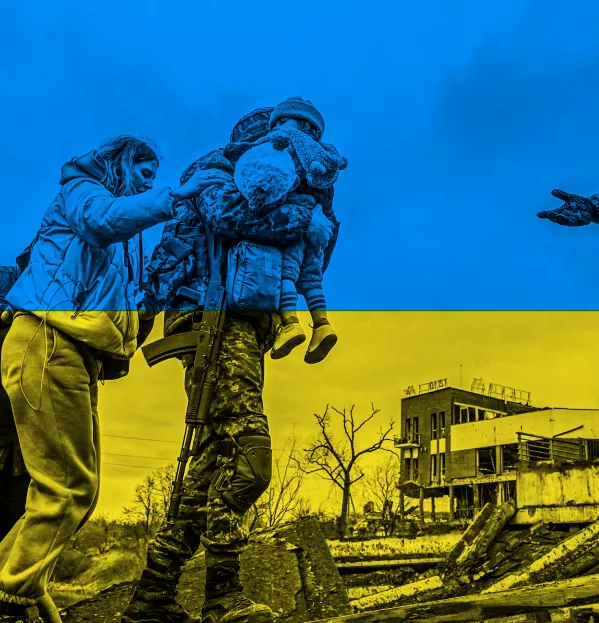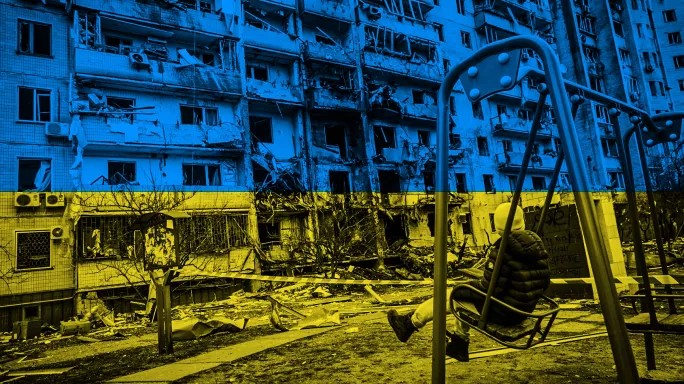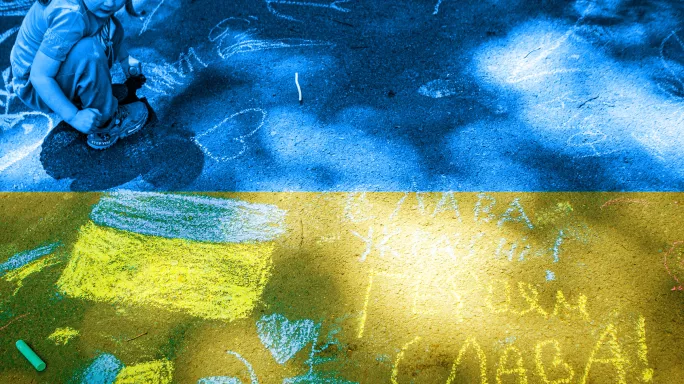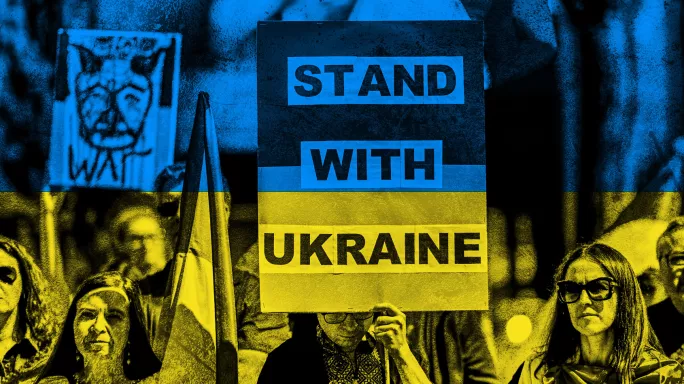How educators around the world are supporting Ukrainian students

“We got a reference for our Ukrainian language teacher that was written on the front line. His boss had a Kalashnikov in one hand and was writing a reference on Telegram with the other.”
Nick Hammond, headmaster of the British School of Paris (BSP), is describing the recruitment processes required to find a Ukrainian teacher who could help educate displaced children from the country in the French capital.
It’s an event he still can’t quite believe has happened: “It was unimaginable even six months ago,” he says, echoing the thoughts of millions around the world.
Indeed, after two years of dealing with Covid, school leaders, like everyone else, might have hoped for a period of normality.
But the displacement of huge numbers of Ukrainians has meant more extraordinary challenges - and international schools have stepped up to play their part, welcoming children, parents and teachers from state and other international schools to their classrooms and communities.
New classrooms
At BSP, this work involved setting up dedicated classrooms for Ukraine’s children - taught by Ukrainian teachers who have fled the fighting - after it became clear that many from the country were arriving in the city and had no access to education.
“For us, it started with two sixth-form boys who had fled with their mothers, and who were being hosted in a local suburb and had connections with the school,” Hammond says.
“Then we had more requests about others joining them [but these] kids didn’t have any French and didn’t have any English, really, so we realised we needed a Ukrainian classroom [in our school].”
Of course, teaching the Ukrainian syllabus in the Ukrainian language was not something anyone in the school was trained in - but they were able to find a primary school teacher who was able to leave Ukraine because he is Cameroonian.
“Now we’ve got somebody who knows the syllabus and the language so that these students joining us can be taught in Ukrainian while focusing on language acquisition, giving them options come September.”
The usual safeguarding checks were carried out - something that delayed the opening of the classroom by a week but that Hammond says could not be rushed - while information on the children from their schools in Ukraine was also gathered to help with the onboarding.
“We were able to get school reports from the seven students coming in downloaded from the cloud and translated, and do some screening tests. They’ve had a school tour and a contract.
“We’ve essentially just tried to treat them like normal pupils from normal families.”
It’s still early days, but Hammond says he believes it is having an impact both educationally and emotionally.
“Like all schools, we talk about values and virtues and development of character. And looking at how these students have settled in, I think we have done some good. We have provided a safe space for them to get back to ‘normal’.”

Thinking ahead
Move across Europe to Switzerland - just 12 hours’ drive from the Ukrainian border - and you’ll find a similar story from Liz Free, director of the International School Rheintal, who explains that it was clear to staff from the moment the war began that they had to help.
“The invasion really challenged our idea of who we are as a school. We talk about being global citizens - we all have that in our mission statements - but are we really living it? We knew that we had to do something that will genuinely make a difference. It’s been an extraordinary collective endeavour.”
This support has manifested as providing lessons for seven students from Ukraine - most living with host families from the school - and employing a Ukrainian teacher to deliver the school’s International Baccalaureate curriculum to these pupils.
Free says doing this is key not just to give the children and teachers stability now but also to ensure the future prosperity of Ukraine is being thought about, too, by ensuring that students complete their qualifications and have the opportunity to reach university.
“University is not everything but it is the place where you have the leaders of countries, whether that’s doctors, lawyers, politicians or teachers - the people who help make and sustain countries,” she says.
“We felt that we had a duty of care to this particular category, to make sure that we don’t lose a generation.”
“We talk about being global citizens - we all have that in our mission statements - but are we really living it?”
Of course, employing new teachers and providing places in fee-paying schools cannot be done for free - and Free and Hammond say making it all work financially could not be ignored. Again, when requests for help were sent out, the response was positive.
“We spoke to the Hilti Family Foundation in Liechtenstein,” Free says. “I then wrote a proposal for a scholarship programme costing half a million francs [£413,000]. And they agreed.”
Meanwhile, Hammond says that appealing to local companies, parents and alumni for funding had a similar outcome in Paris.
“The response has been extraordinary, with significant donations coming in to support our Ukrainian teachers, who cannot work for free and absolutely shouldn’t.”
It’s not just on purely educational matters that schools and their communities have stepped up, either: it is also to help provide items for families who had to leave everything they owned behind.
“We prepared backpacks for them with sandwich boxes, water bottles, calculators, pens,” recalls Free. “It’s actually raining today, and one of the staff just went out and bought rain jackets for our students.”
In Paris, the school has set up a “supplies bank” every Saturday morning where, owing to connections to large French brands in the capital, they are able to provide Ukrainian families with essentials such as sanitary towels, personal hygiene products and underwear.
“Last weekend, we had 350 Ukrainian refugees come. There is coffee and it has become a hub in the support network - a place for their community - so we have people coming from all over Paris,” says Hammond.
Stages of emotion
The same story is being repeated at Frankfurt International School, which is now home to several students from Ukraine, whom the community has been more than willing to help out.
“We’ve got an email that goes out on Fridays and Wednesdays, with different needs and flagging different things that are going on,” explains Paul Fochtman, head of the school.
“Anything that’s asked for - medicines, doctors, anything - it’s probably taken care of within an hour.
Even closer to Ukraine is Heritage International School in Moldova. Rob Ford is director there.
“We have gone through a lot of stages of emotion since that Thursday morning when missiles rained all over Ukraine, but fear, apprehension and uncertainty predominate a very nervous Moldova,” he says.
Even so, this is, as Ford describes it, “a small country with a big heart”.
And so, taking their lead from the Moldovan government, they arranged collections to support the hundreds of thousands of refugees now in a country of fewer than 3 million people. They have taken in students, too.
“We have a number of Ukrainian families who have joined us, as well as Russian families who have also felt the need to leave Russia because of the war and climate there,” says Ford.
“Our students and staff spontaneously volunteered to support the special shelters the government has set up.
“Within the school, we have worked hard to keep the focus on the daily routines, getting through international GCSE and A-level exams, and living our international, humanitarian values as a school community of more than 20 nationalities.
“This war is very painful for so many of our communities, especially with family ties to both Ukraine and Russia.”

Teaching amid air-raid sirens
Meanwhile, in Ukraine itself, while the war has utterly devastated much of the country, international schools have done whatever they can to maintain teaching and learning for their pupils - as Tes learned earlier in the year.
Anton Zastavniy, chief executive of the British International School in Ukraine (BISU), explains that this work has continued since and that much of what was learned in the pandemic about remote teaching has come to the fore - but in a context that is even more shocking.
“We have Ukrainian teachers who are in underground shelters with their families, and they are on Microsoft Teams, teaching from there.
“We actually try to have two teachers online in each lesson. Why? Because then, if the air-raid siren goes for one of them in one city, the other can stay and continue the lesson.”
Anna Azarova is BISU’s communications lead and agrees that trying to maintain whatever “normal” they can has been a priority: “We are trying to provide ‘normal’ for our students: having lessons, socialising with friends, communicating with each other on screen.
“Our teachers are still very effective and doing their best to offer a full academic curriculum. And this is what our students want. We are doing our best to keep our community together.”
This desire among students to keep learning is something that Fochtman says he has seen, too - both in terms of finishing their studies and looking to learn English for whatever their future might hold.
“We have students on campus who have joined classes, then others nearly finishing sixth form, who just need the library and wi-fi to access their teachers elsewhere,” he explains.
“Then we’ve started English lessons for those who aren’t actually at our school and also for parents in the region.”
On top of this, the school has offered students a place at its graduation ceremony, telling them to come in whatever regalia they might have, so they can celebrate this rite of passage.
“We’ll have some Ukrainian blue and yellow in among our own school colour of burgundy,” he says.
“All we want is for them to know that there is another world, one where they are raised in peace, are loved and feel safe”
Even with this drive for normality, however, it is unquestionable that, for many children and their parents, what they have been through is deeply traumatic and will leave scars that last a lifetime.
That is why Stephen Priest, principal of the British International School of Tbilisi, Georgia, is trying to provide counselling for people fleeing the war - something he knows will prove of use, having lived in Nepal during the devastating 2015 earthquake.
“One of the things that became important after the Nepal earthquake was online counselling, with counsellors from schools across the Council of British International Schools (Cobis) network offering their support to our staff and students.”
As such, he says, a similar network is needed, and he is working to once again coordinate this through Cobis member schools - and perhaps beyond.
“The situation in Ukraine would need greater organisation for a larger-scale counselling programme,” he says.
He suggests, perhaps, that an organisation such as the Red Cross could coordinate it so that if an international school had a counsellor willing to do online sessions for students, that could be facilitated.
“Without counselling, many more people who may not even, at present, display any of the signs of trauma could have problems building up inside them that could affect their future health, careers, education, their families and lead to other negative social problems.”
Azarova and Zastavniy agree it is an area that needs focus now and in the long term for students and teachers from the country.
”This war has traumatised so many children. We are absolutely sure that most misplaced Ukrainians are willing to go back home, even knowing that their homes are destroyed, but there is going to be a huge need for mental health support.
“We are currently trying to find ways to approach this professionally.”

‘Keep spreading the word’
For Azarova and Zastavniy, underpinning all this is their desire to ensure that the plight of those still in the country and who have fled remains in the spotlight, and that help continues to be offered on the political stage and within education.
“The best thing you can do is keep spreading the word about the ongoing war in Ukraine and keep this at the forefront of people’s minds within their community,” Azarova says.
Judging by the reaction to their presence at the Cobis annual conference in London in early May, it seems unlikely that the educational community will forget any time soon, with standing ovations at the opening keynote and end-of-conference dinner in recognition of their country’s fight.
Colin Bell, chief executive of Cobis, says it was an honour to have been able to host Azarova and Zastavniy, and show them that support from the wider international school community is steadfast.
“Cobis is always open to exploring ways to use the power of our network to support children and young people, our schools and the wider communities in which they exist,” he says.
To this end, the organisation has been running webinars for school leaders in international schools that want to help support Ukrainian students - and pressing the government for more help, too.
“We have also lobbied the prime minister and foreign secretary to ensure that the plight of staff and students from BISU is recognised,” he adds.
For Zastavniy and Azarova, all this support - classes in Paris, places to stay in Switzerland, counselling services in Georgia, students at end-of-term proms in Germany and lobbying in the heart of Whitehall - has, of course, not gone unnoticed.
Educationalists to their core, they are clear that everything being done is about trying to give the next generation a chance to have a normal childhood and escape the shadow of the terrible war that has engulfed their country and upended their lives.
“All we want is for them to be global citizens, for them to know that there is another world, one where they are raised in peace, are loved and feel safe,” says Zastavniy.
“To the global community of schools who are helping to do just that: we thank you.”
Kester Brewin teaches maths in south-east London. He is also a journalist and the author of a number of non-fiction books. His debut novel, set in a school, will be published this summer. He tweets @kesterbrewin
You need a Tes subscription to read this article
Subscribe now to read this article and get other subscriber-only content:
- Unlimited access to all Tes magazine content
- Exclusive subscriber-only stories
- Award-winning email newsletters
Already a subscriber? Log in
You need a subscription to read this article
Subscribe now to read this article and get other subscriber-only content, including:
- Unlimited access to all Tes magazine content
- Exclusive subscriber-only stories
- Award-winning email newsletters
topics in this article



